About The Photographer
With the technological advancements in cameras and drones, we can now get a glimpse of the world from a different perspective. And from high up above, especially with a bird’s eye view, the world is a stunningly beautiful place.
In the last few years there has been an explosion of interest in the emerging field of aerial drone photography. Discovering a location from a different vantage point allows seeing a familiar location from a totally different perspective. For over a century we have been taking and seeing photographs from an eye level perspective. Taking that camera just 10 or 20 meters higher up, changes the way we see a familiar place, a natural wonder or a cultural landmark. Jure Korber and Tjasa Borsnak, a young student couple based in Slovenia’s capital Ljubljana, have accomplished just that – they took their aerial photography platform called Hexabee into the sky and captured Slovenia from angles not seen before. The result is a stunning work of art showcasing one of the most beautiful countries in Europe.
Feast your eyes on some stunning views, angles and shots from high up above. Here are 35 breathtaking aerial photographs of Slovenia’s cities, towns, natural wonders and cultural landmarks you have to see to believe by Jure Korber and Tjasa Borsnak. And if you want to see more of their impressive work, or if you are interested in aerial drone photography in general, don’t forget to visit their Facebook page Jure Korber Photography.
Note: Most of the photos featured here are now illegal to take because of the regulations already in place prohibiting drones from flying over specific areas for security concerns.
Photo Gallery
A beautiful picture gallery containing 35 stunning aerial drone photos from around Slovenia by Jure Korber and Tjasa Borsnak.
Lake Bled is probably the most famous destination in Slovenia, even more so than the capital Ljubljana. The place looks like it has been lifted straight out of a children’s fairytale. The water is green-blue and ridiculously clear with an island sporting a medieval church conveniently located in the middle. To make the scenery even more spectacular, the lake is surrounded by lush green mountains and there’s a magnificent castle perched on a cliff directly above the lake.
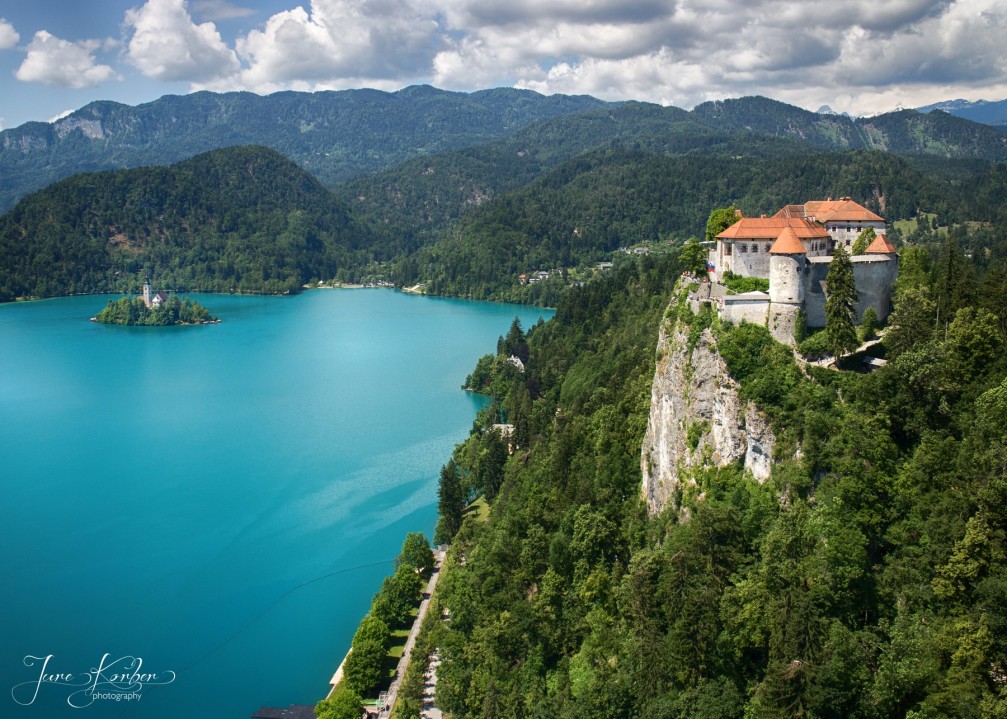
Perched atop a steep cliff more than 130 meters above the lake, Bled Castle is one of the most-visited historic attractions in Slovenia. Dating dating back to at least 1011 (when it wast first mentioned), the castle today is mostly a museum, with displays on the history of the Bled area and medieval life.

A small tear-shaped island lies spectacularly in the middle of Lake Bled and you can take a ride with the traditional Pletna boat or hire a rowing boat to explore it or just sit and take in the view of a medieval church which stands tall in the midst of the lake. Because of Bled’s commitment to eco-friendly, sustainable tourism, motorized boats are not allowed on Lake Bled to avoid water pollution. It’s because of this fact that the glacial lake is crystal clear.
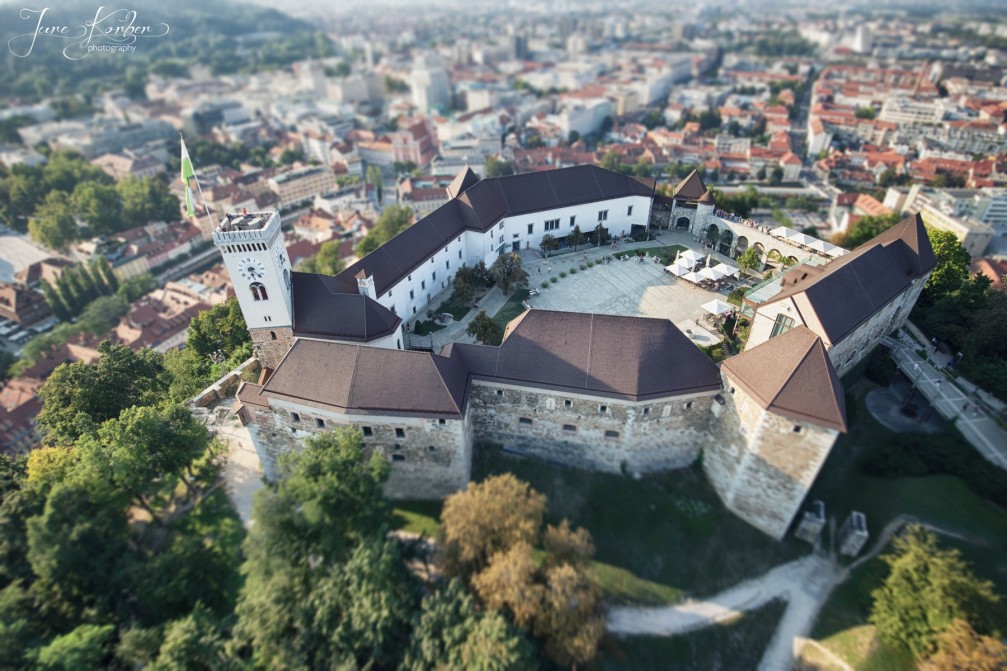
Slovenia’s capital Ljubljana is beautiful and quaint with its pedestrian streets along the river, countless green public areas, and the castle on the hill. In fact, each time you look up in Ljubljana you’re greeted by the castle, a dazzling medieval fortress with a modern twist. You can walk up to the castle or take the funicular and once you’re at the top you’ll have stunning views over the whole city and beyond.
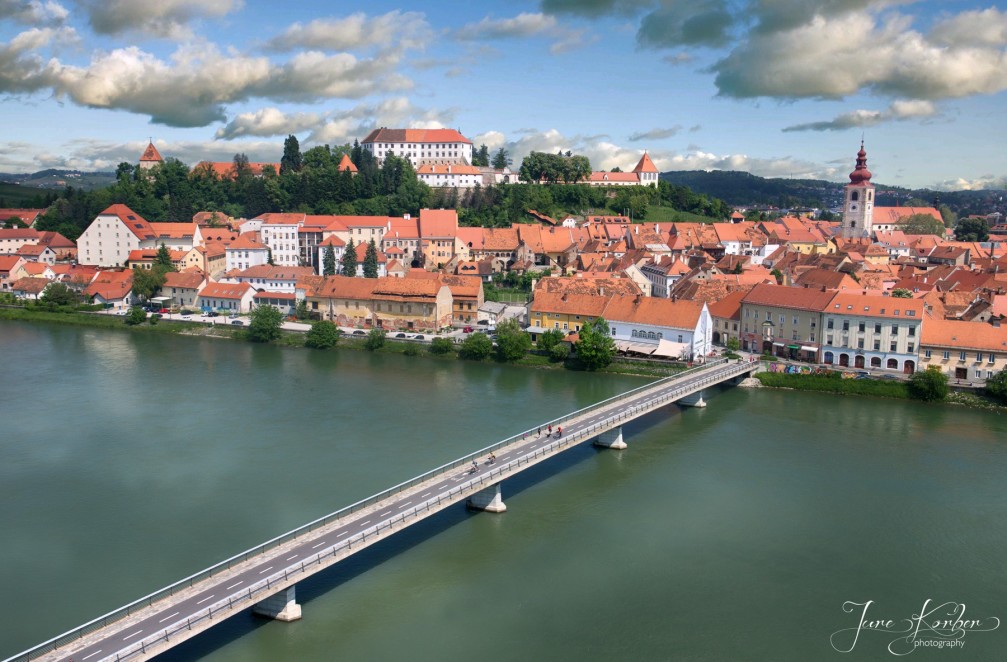
Ptuj is the oldest town in Slovenia, located in the northeastern area of the country. It was inhabited as early as the Stone Age, and was settled by Celtic tribes by the late Iron Age. The town took on specific importance in the first century AD, when Ptuj was first mentioned as a Roman settlement called Poetovio, which was the headquarters of an important Roman legion. Today some of the pottery and artifacts from this era are preserved in the Ptuj Regional Museum.
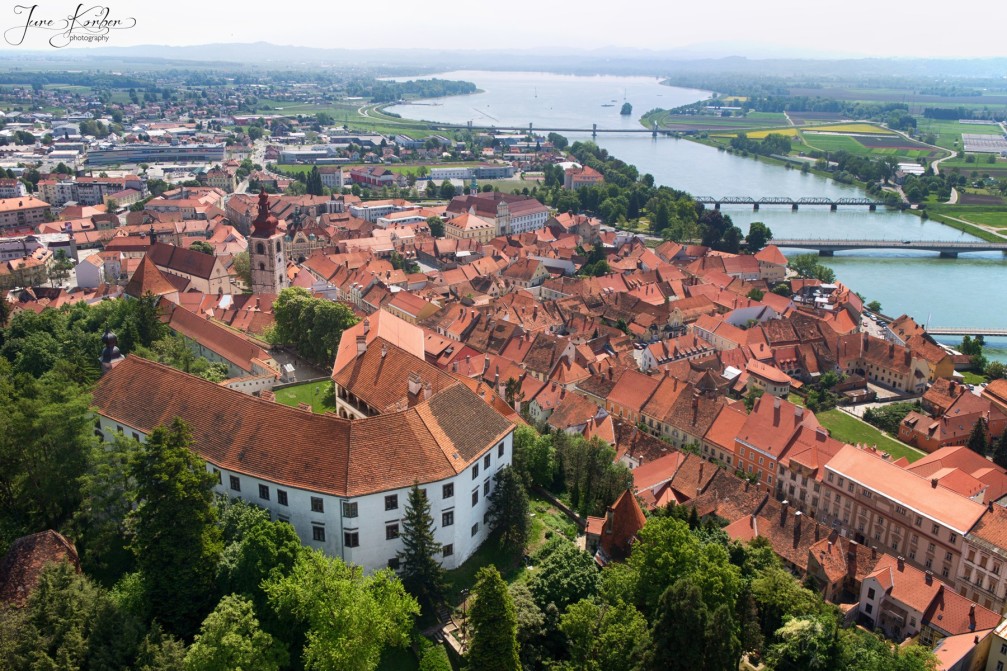
Located next to a beautiful lake, Ptuj now has has many interesting churches and monasteries, a medieval castle built in the mid-12th century (which is strategically located on a hill overlooking the Drava River), Slovenia’s oldest wine cellar, lots of storks nesting on its red roofs and one of the most impressive carnivals in Europe called Kurentovanje, which draws tens of thousands of visitors each year!
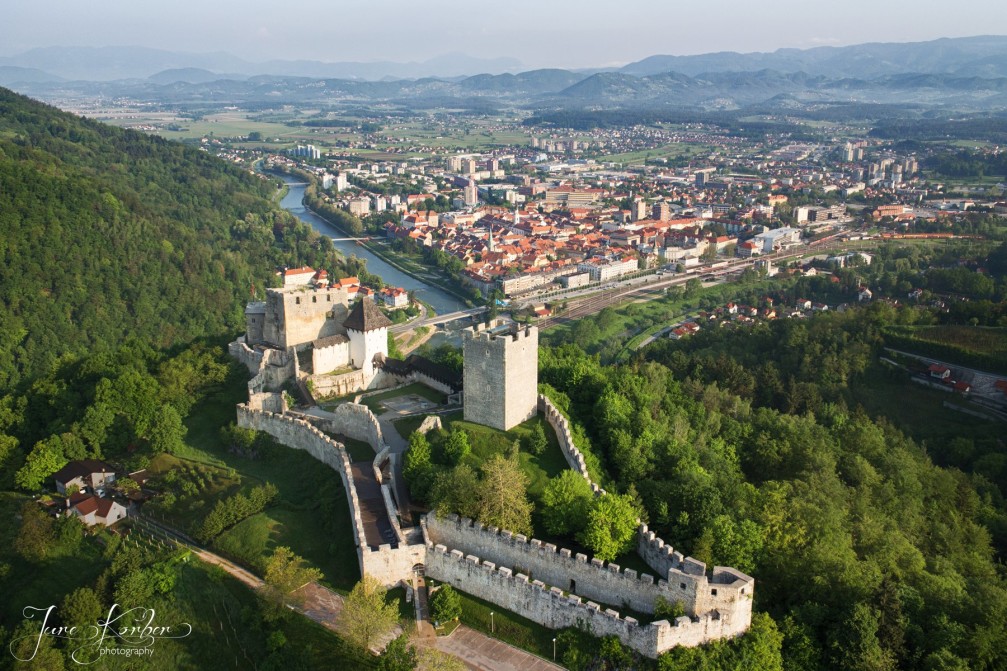
Slovenia’s third-largest city Celje was built by the Romans in the 1st century AD as Celeia. Located on the Savinja river, around 75 kilometres northeast of Slovenia’s capital Ljubljana, Celje now has a lovely old town with a pleasant provincial mix of Renaissance, Baroque and 20th-century buildings and squares. Celje’s best-known landmark is the medieval Old Castle perched on a 400 meters high rock southeast of town. The castle was built by the counts of Celje in the 14th century and is the largest castle complex in Slovenia offering tremendous views of the city.
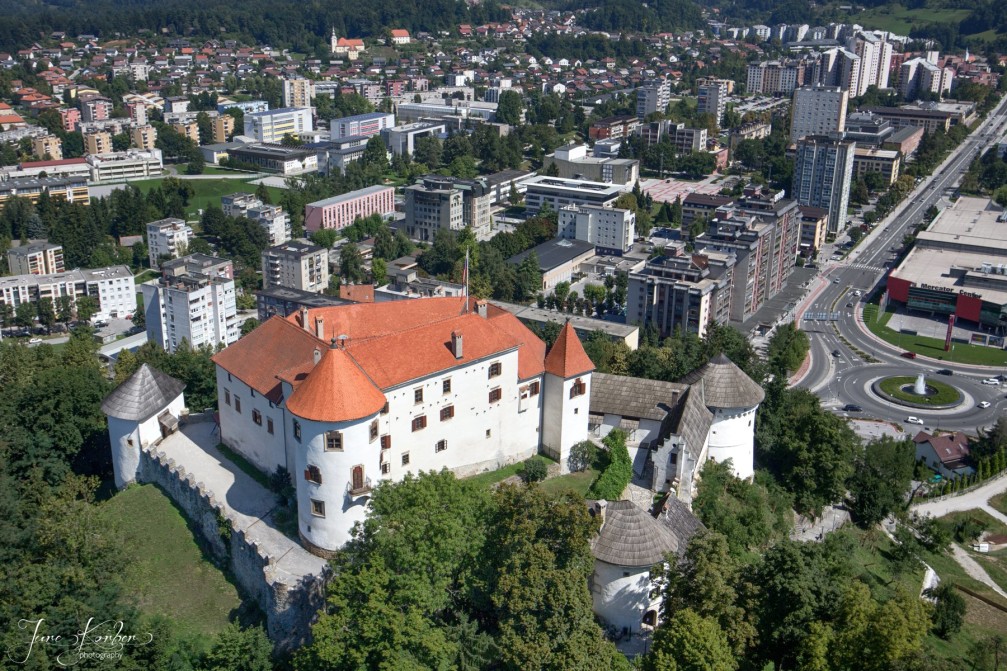
Slovenia’s fifth-largest city Velenje and its dazzling castle were first mentioned in 1264, when Velenje was a small market town. Due to the discovery of one of the world’s largest lignite deposits, the town started to expand after the second half of the 19th century and especially after the Second World War. Nowadays, Velenje is a youthful regional capital that is just waiting to be explored, both by foreign and domestic tourists. Velenje’s best-known landmark is the white fairytale Velenje Castle which sits atop a hill just above the town. The castle’s core was built in the 13th century, but most of its present form was acquired in the 16th century. Fully restored, it is today one of the most beautiful buildings in Slovenia housing several unique exhibitions and interesting museums and offering tremendous views of the city of Velenje.
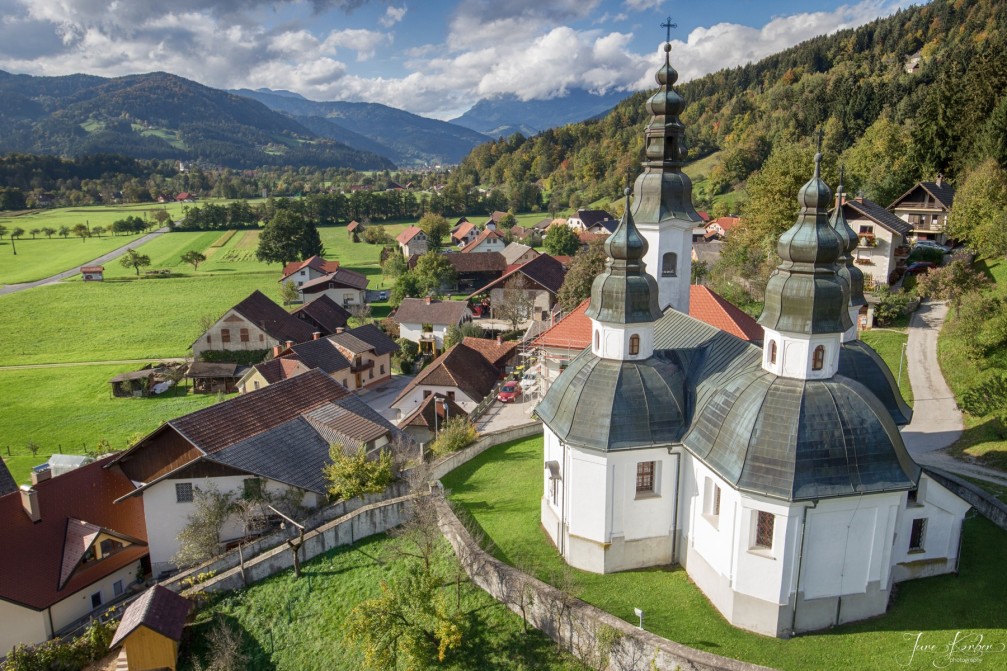
The small village of Okonina lies on the left bank of the Savinja river in the Styria region of Slovenia. The village’s best known landmark is the Church of St. James which was first mentioned in the historical record as early as 1426, but the current building dates to the 1720s.
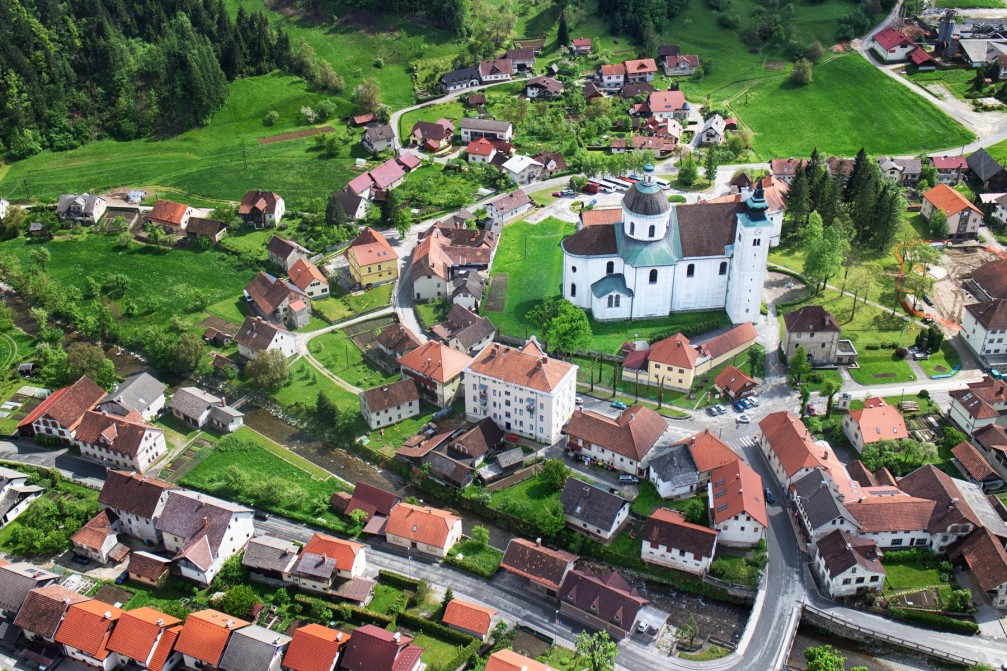
The lovely small historic town of Gornji Grad lies on the Dreta river in the Upper Savinja Valley. The town’s best known landmarks are the Benedictine monastery built in 1140 and the baroque cathedral of Saints Hermagor and Fortunat which has the valuable altar paintings of Kremser-Schmidt and the tombs of the first bishops of Ljubljana.
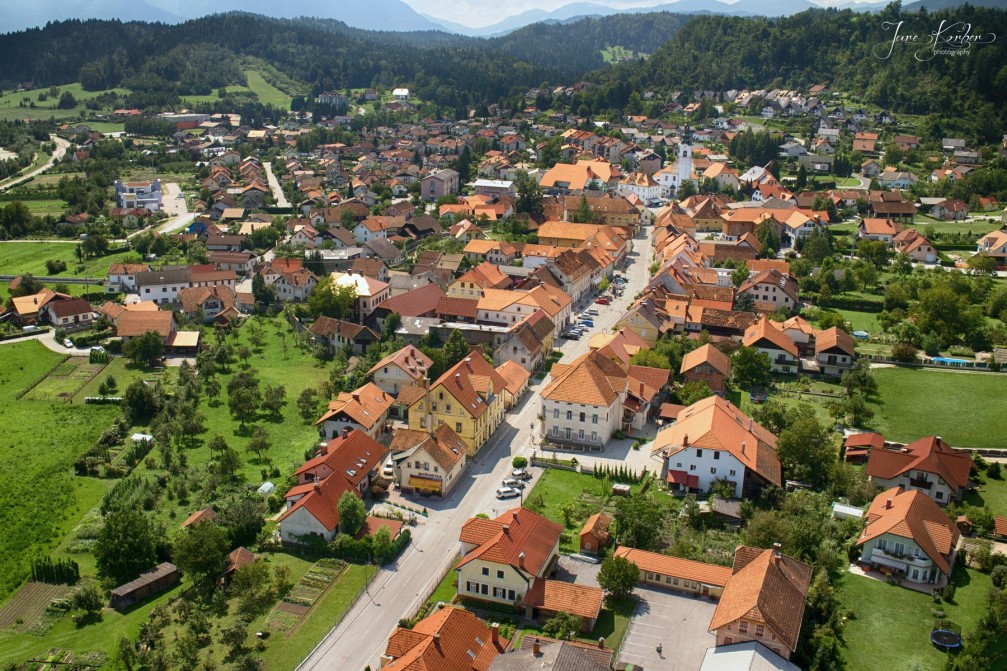
The small town of Mozirje lies on the Savinja river in the Styria region of Slovenia. The town was first mentioned in the historical record as early as 1146. It’s best known for having one of Europe’s most beautiful botanical gardens named Mozirski Gaj, which opens every year on April 21st and boasts colourful displays until the late autumn. Another town’s landmark is the Church of St. George which was first mentioned in 1241, but the current building dates to the 1754.
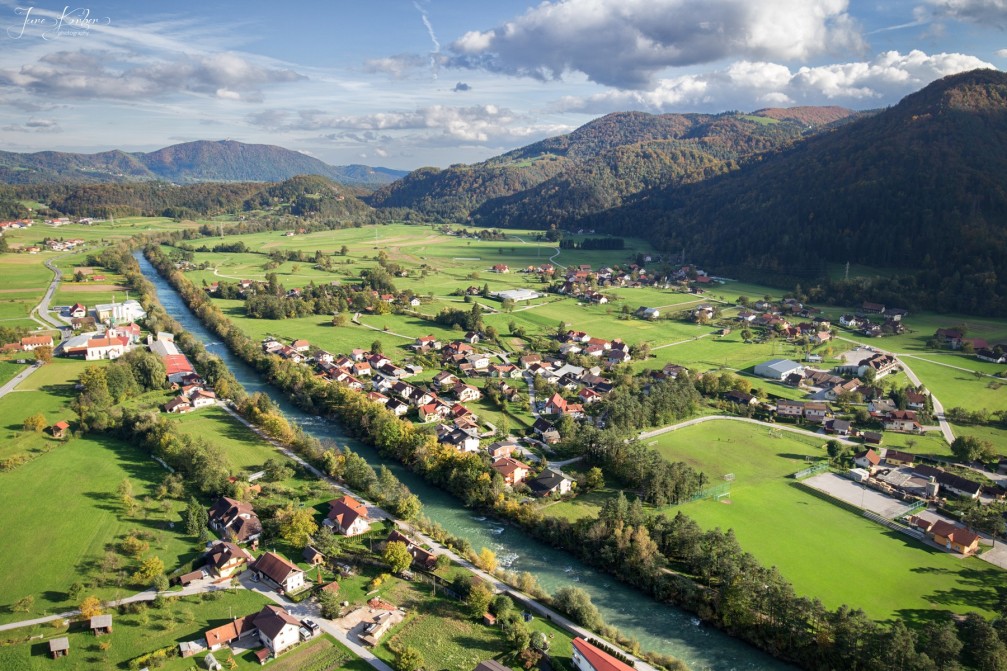
The small village of Loke pri Mozirju lies on the right bank of the Savinja River south of Mozirje.
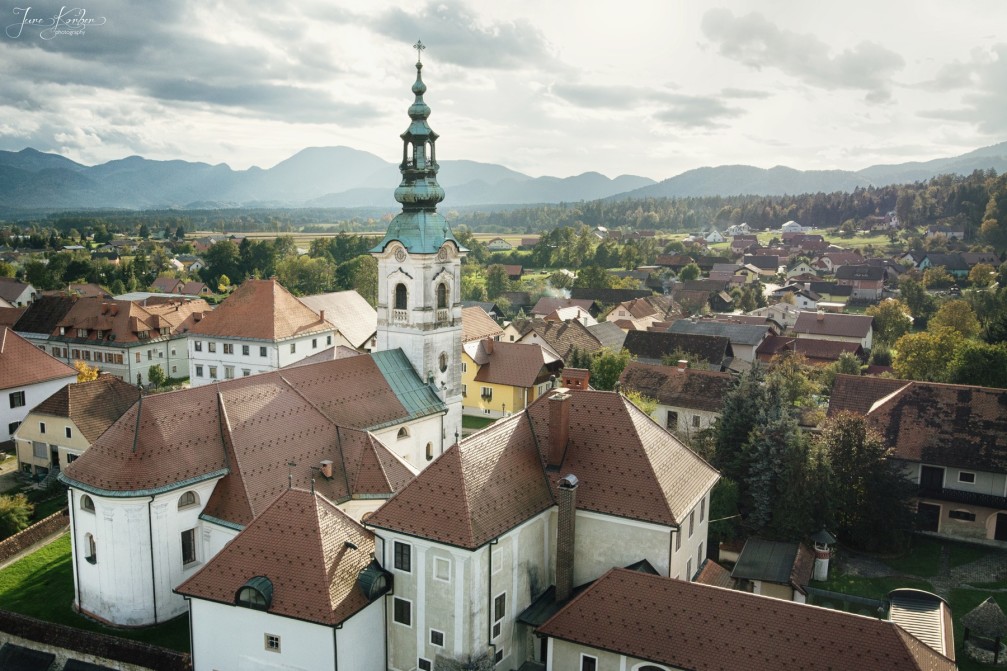
The small town of Braslovce lies in the Lower Savinja Valley in the Styria region of Slovenia. The town was first mentioned in the historical record as early as 1140. Its best known landmark is the Church of the Assumption of Mary which was first mentioned in written documents from 1120, but most of the current building dates to the 18th and 19th centuries.
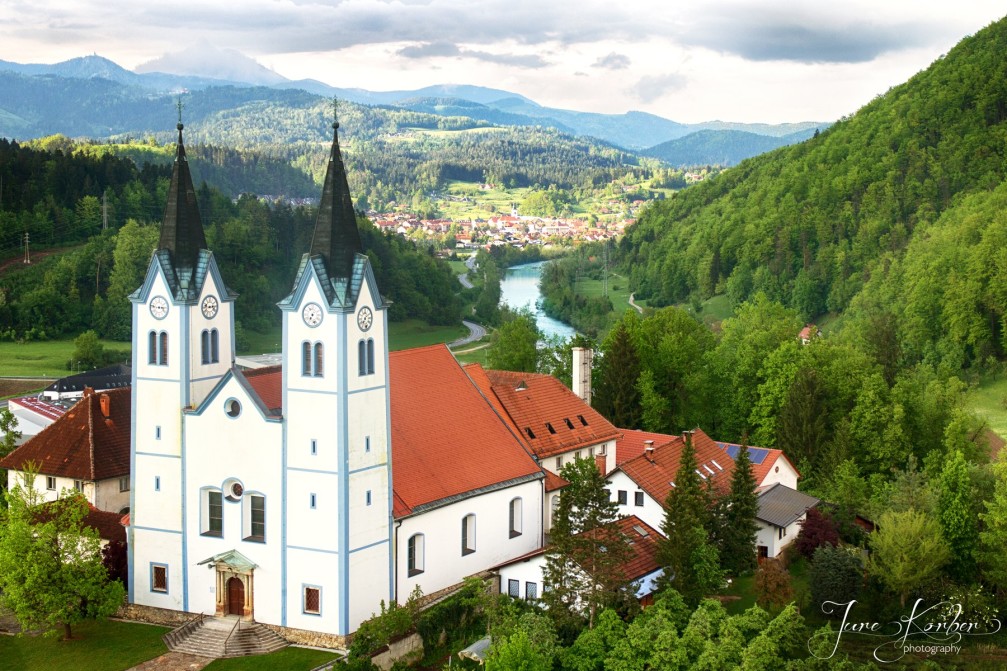
The Church of the Mother of God in the town of Nazarje was built in 1661. It’s a typical Renaissance building with a beautiful Baroque interior.
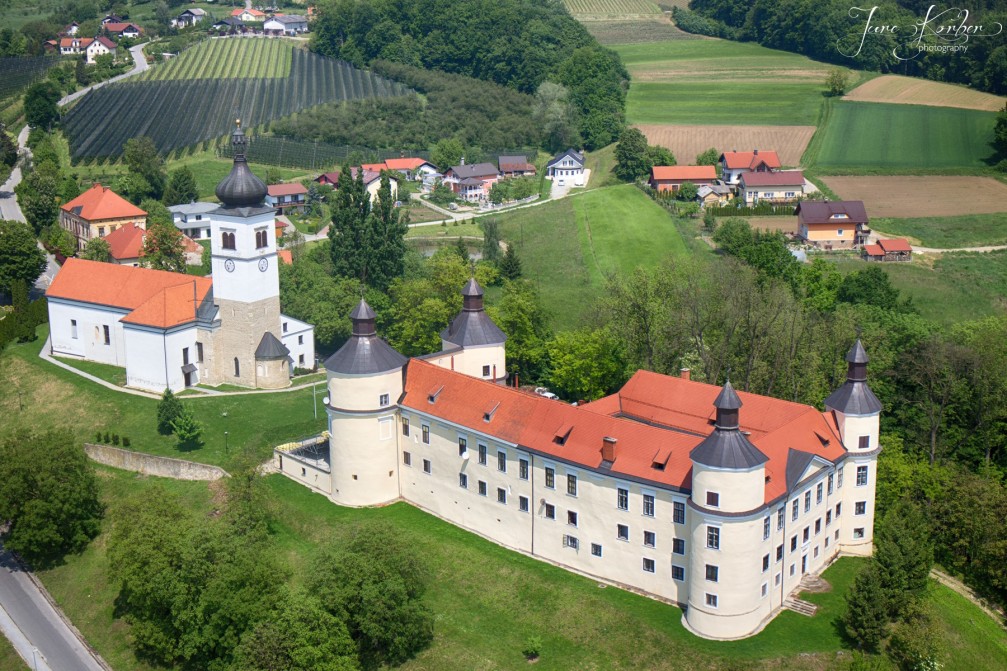
The best known landmarks in the idyllic village of Velika Nedelja in the northeastern corner of the country are the Parish Church of the Holy Trinity and the neighbouring Velika Nedelja Castle. The castle originates from the 13th century and was rebuilt and expanded in the 17th and 18th century and completely renovated in 1989. The church next to the castle is an originally Romanesque single-naved building with a belfry (some Romanesque sculpture is preserved on the facade and the interior of the church) and 18th-century Baroque additions.
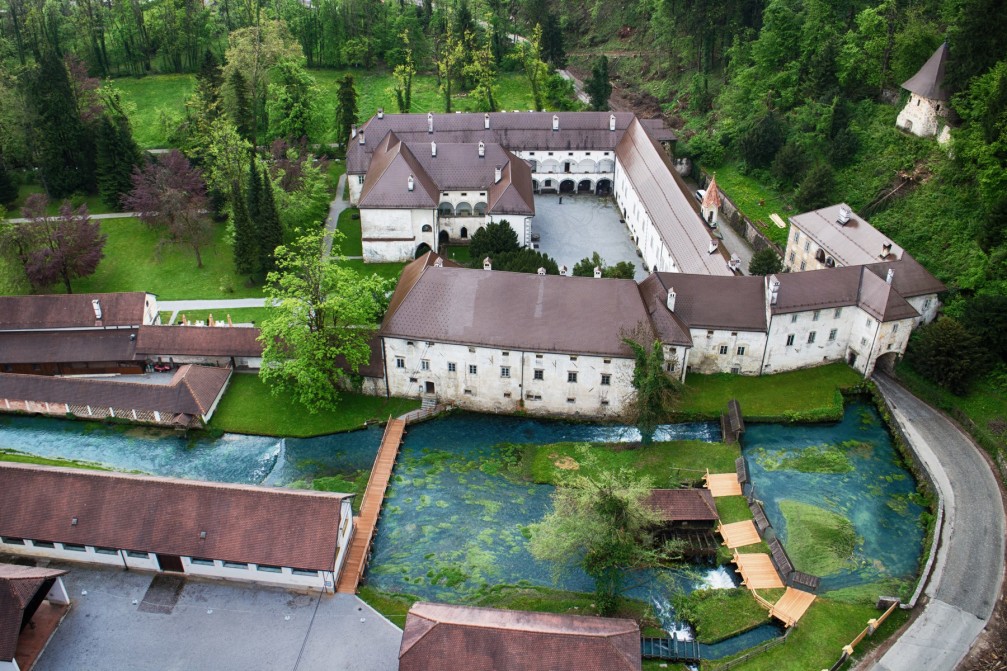
The Technical Museum of Slovenia, well known for its extensive collections and presentations of technical heritage, is housed in the 6,000-square-metre building of the Bistra Castle, formerly a monastery, with a scenic garden, a fish pond and an educational trail through the nearby forest.
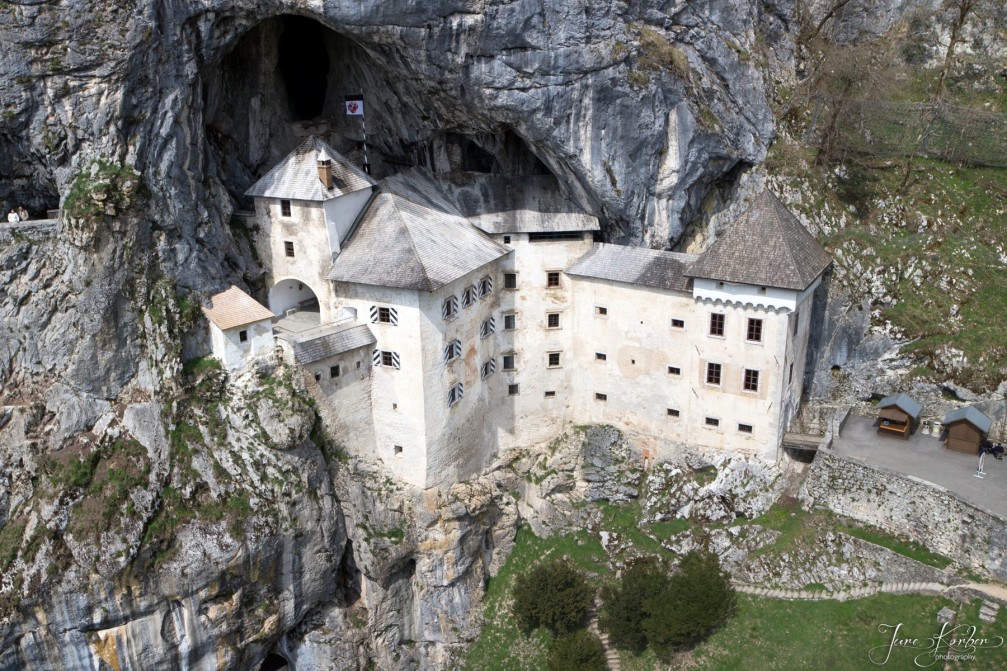
There’s something magical and mysterious about visiting centuries-old castles. And the Renaissance-style Predjama Castle is one of the most unique castles in the world. Why, you ask? Because this 12th-century castle sits nestled in the mouth of a cave and is set within a 123-metre-tall rock face. The castle isn’t particularly huge, but it looks and feels like something that would easily fit into a fantasy novel.
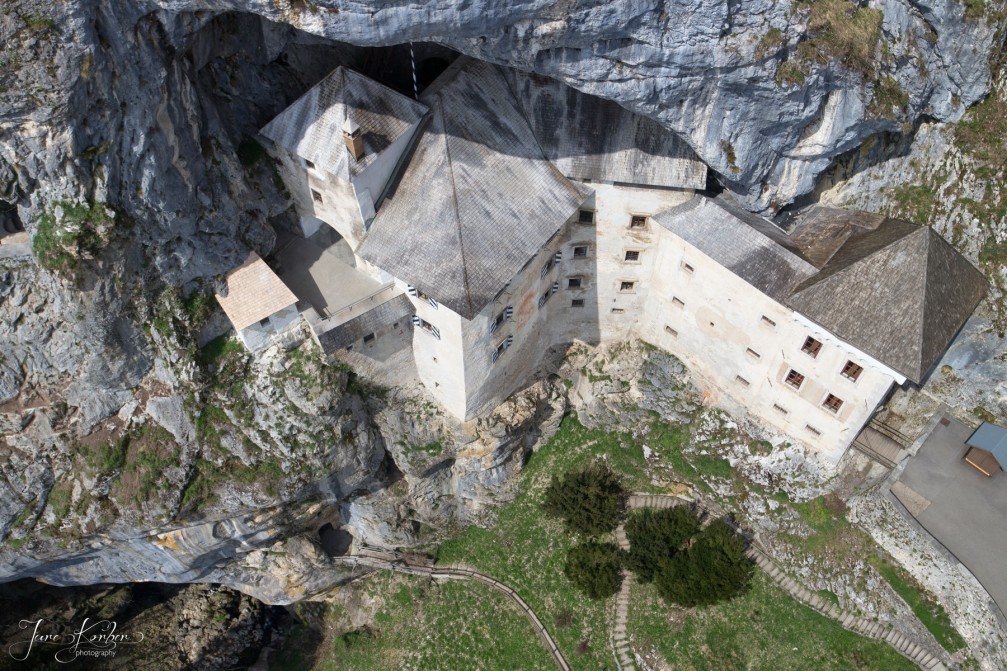
The Predjama Castle or Predjamski Grad as it is called in Slovene is perched in a cavern 123 meters up a steep overhanging cliff. Erected in the 12th century, the castle took on its current appearance under the ownership of the Cobenzl family, who rebuilt it. It has a drawbridge over a raging river, holes in the ceiling for pouring boiling oil over intruders, a dungeon, many natural water wells, and a eerie hiding place at the top called Erazem’s Nook, a secret shaft and tunnel system that leads all the way to Postojna Caves.
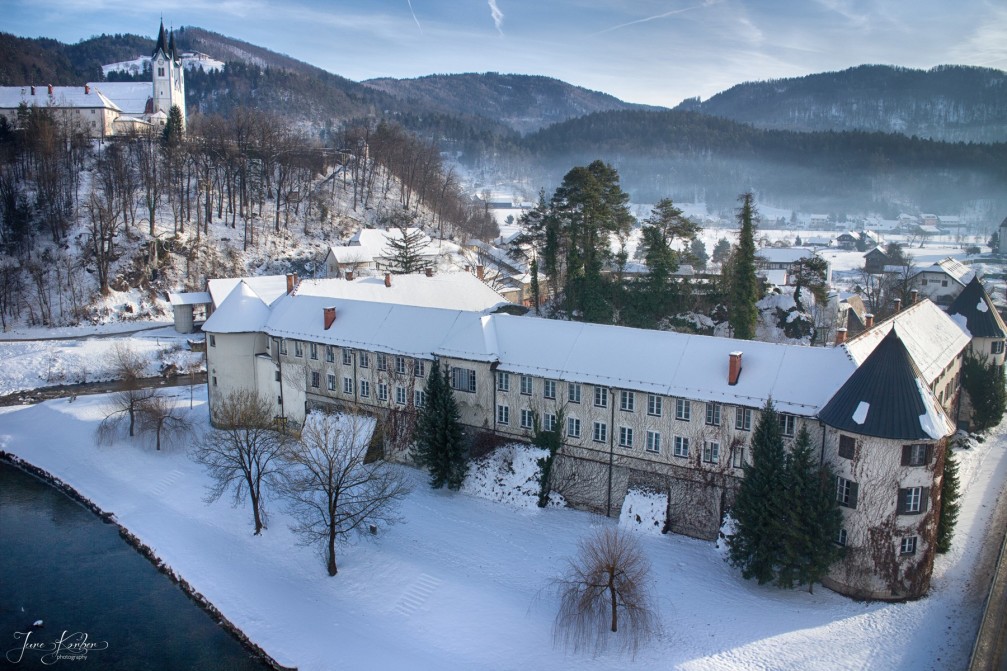
Vrbovec Castle stands at the confluence of the Dreta and Savinja rivers near the town of Nazarje. The castle is considered as the most important monument of secular medieval architecture in the Upper Savinja Valley. Erected in the 12th century, the castle took on its current appearance around 1480, with the medieval core of the castle being removed in the 18th century. During the Second World War the castle burnt down and was completely renovated between 1988 and 1992. Today the castle houses forestry services, the town government, the local wedding hall, a restaurant and a museum of forestry and timber.
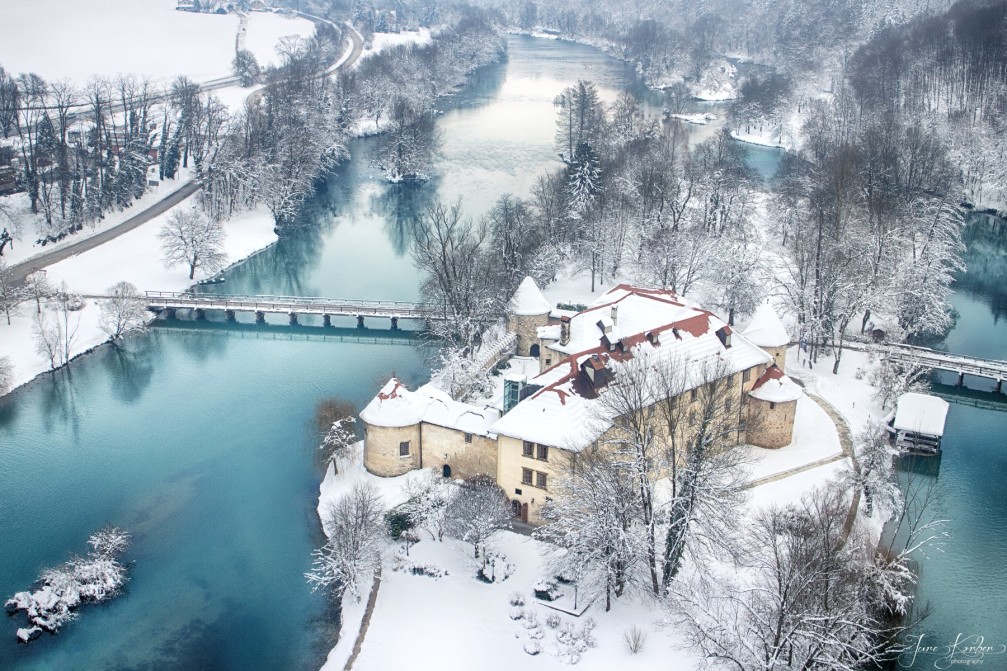
The Otocec Castle or Grad Otocec as it is called in Slovene was originally built on the bank of the Krka River in the 13th century. Eventually the threat of invading hoards lead the castle’s owners to dig a canal, which transformed the land around the castle into an islet. The islet is now linked to both banks of the river by bridges and the castle has been converted into a small luxury hotel.
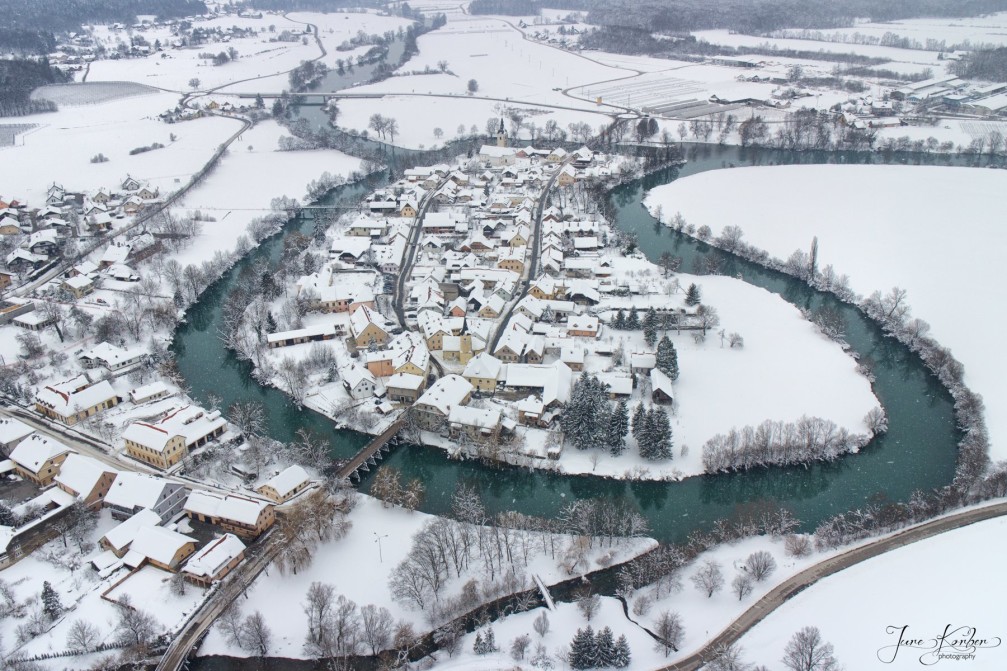
The small town of Kostanjevica na Krki is located in the southeastern corner of the country near the border with Croatia. The town’s center lies on a small island in the Krka River. Due to several floods through the town’s history, when the only way to get around was by boat, the town became known as the Venice of the Lower Carniola region. The town was first mentioned in the historical record in the early 13th century and is now protected as a cultural and historical monument.
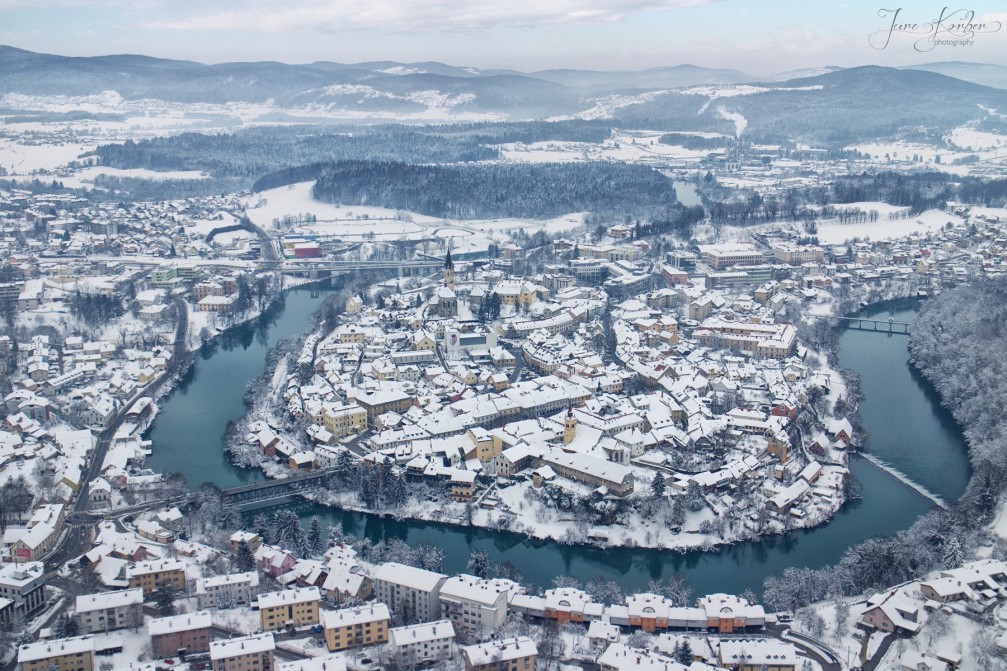
Novo Mesto is situated on a very sharp and extremely scenic bend of the Krka River. The town was first mentioned in the historical record as early as 1365 and is now the political, economic and cultural capital of the Lower Carniola region of Slovenia and one of its most beautiful towns. Novo Mesto’s Old town which stands on a rocky promontory above the left bank of the Krka river is very picturesque and well worth exploring.
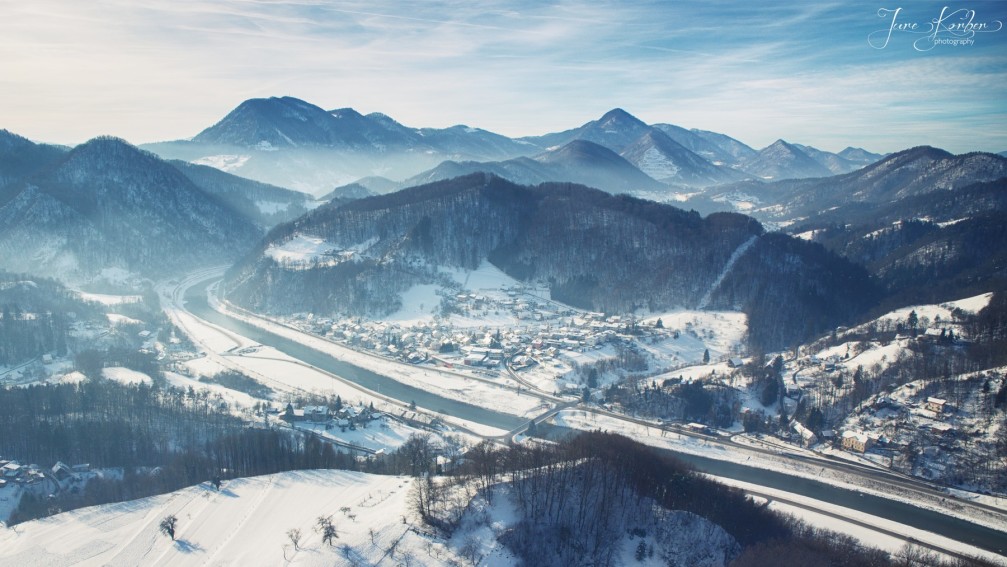
The town of Lasko lies on the Savinja River at the foothills of Hum Hill. The town was first mentioned in the historical record in 1227 but the area was inhabited as early as the Iron Age and Roman archaeological finds are common around the town. Nowadays Lasko is best known for its annual Festival of Beer and Flowers and the local Lasko Brewery, which is the largest brewery in Slovenia.
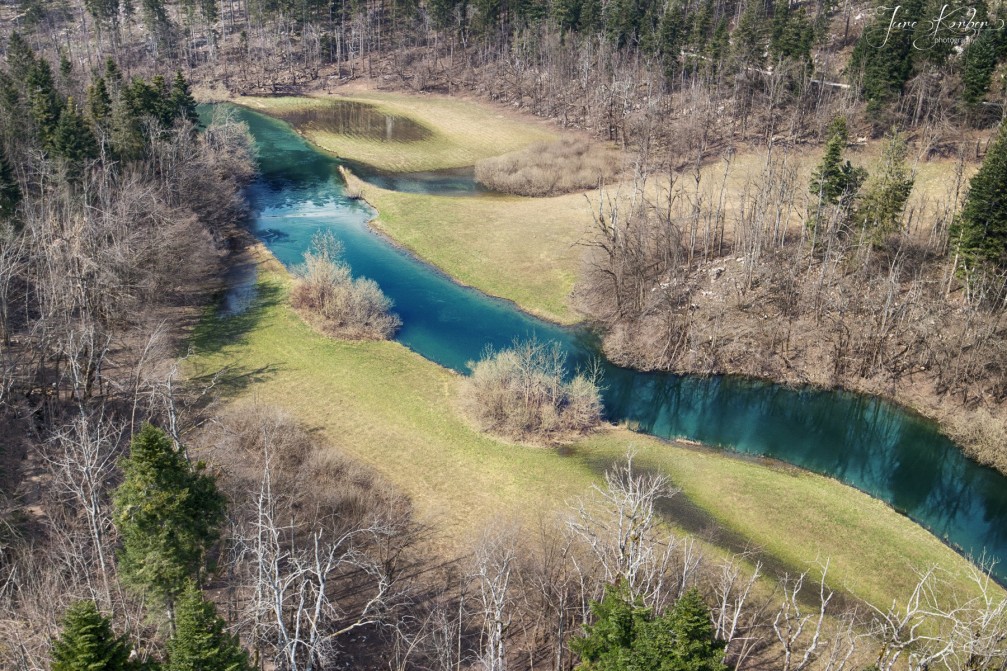
The valley of Rakov Skocjan near the town of Cerknica is well known for its landscape park with many natural attractions along the Rak river that appears and disappears from the ground. The area is beautiful, even if it’s the end of winter and the nature is still sleeping. In the summer, it’s crazy gorgeous.
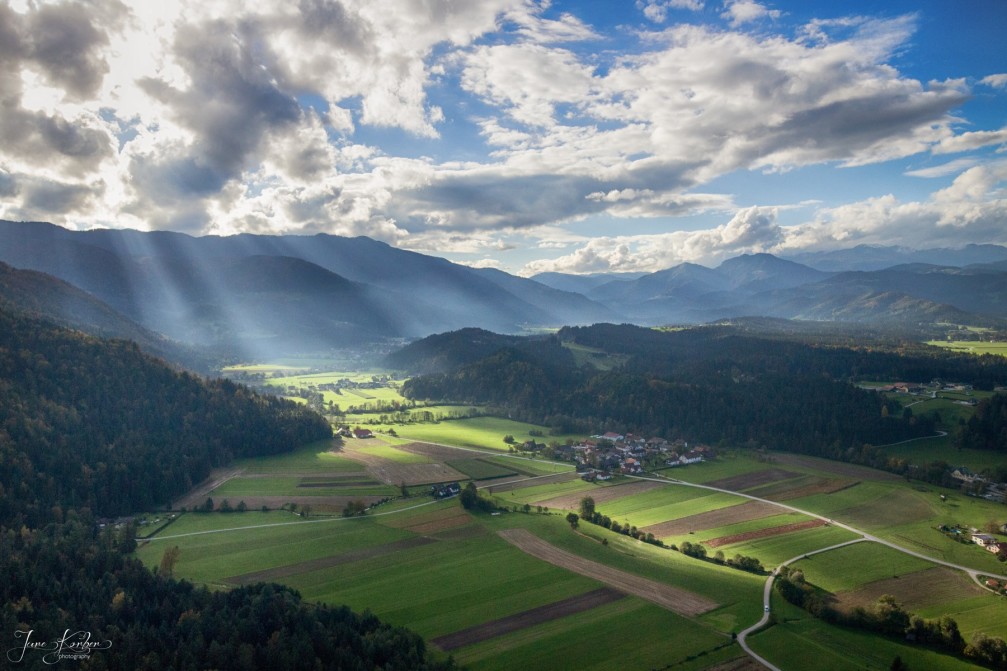
Situated near the city of Celje in the Lower Styria region of Slovenia, the Upper Savinja Valley is considered as one of the most beautiful and greenest valleys in Slovenia. It is bound by forests, farm fields, pastures, small villages, churches, and high Alpine peaks. There are activities here to suit every taste – from walking and hiking to cycling and horse riding.
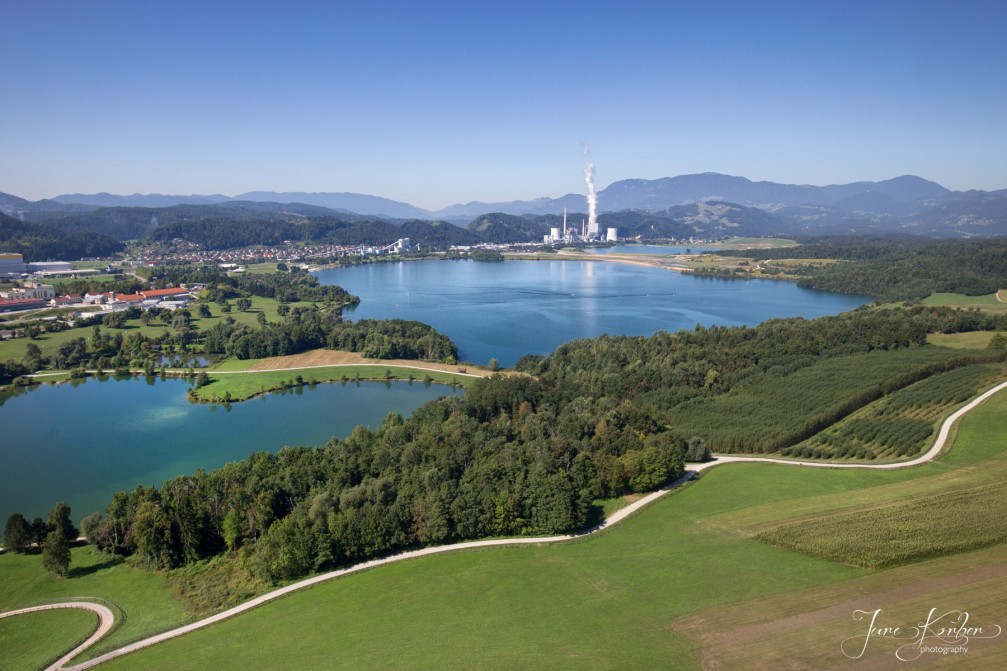
The Salek Valley or Saleska Dolina as it is called in Slovene is a basin in northern Slovenia named after the Salek Castle near the town of Velenje. It is approximately eight kilometres long and two kilometres wide. It contains a number of rivers and lakes including Lake Skalsko Jezero (the left one), Lake Velenje (the middle one) and Lake Druzmirsko Jezero (the right one next to the Sostanj thermal power plant).
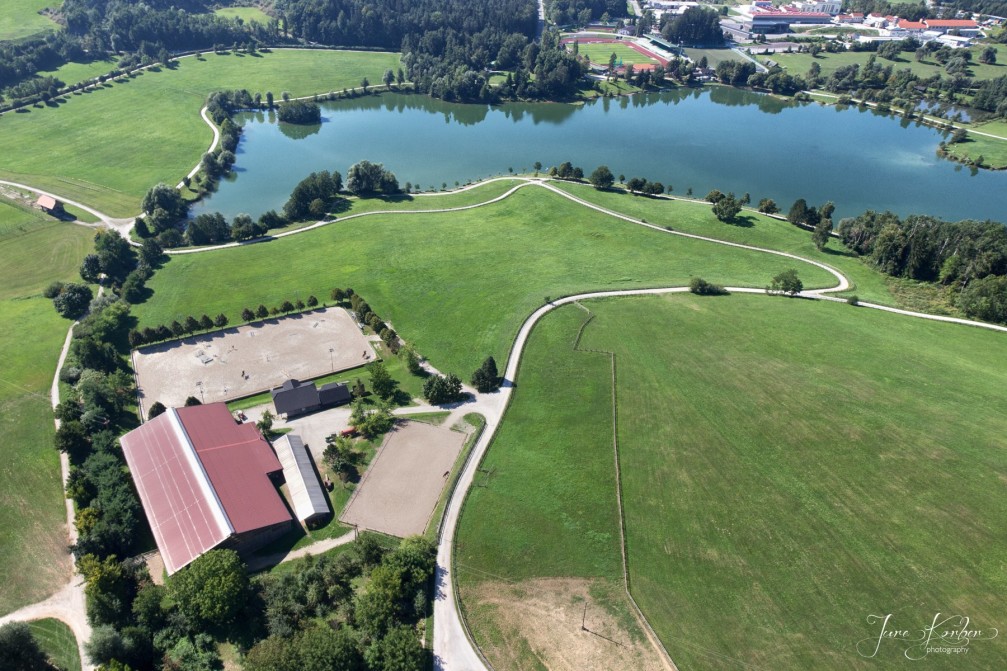
Horseback riding is one of the most popular outdoor activities to enjoy in Slovenia because it’s a fantastic way to explore the countryside and there are several horse-riding clubs all across Slovenia where you can ride to your heart’s content, along with your friends and family.
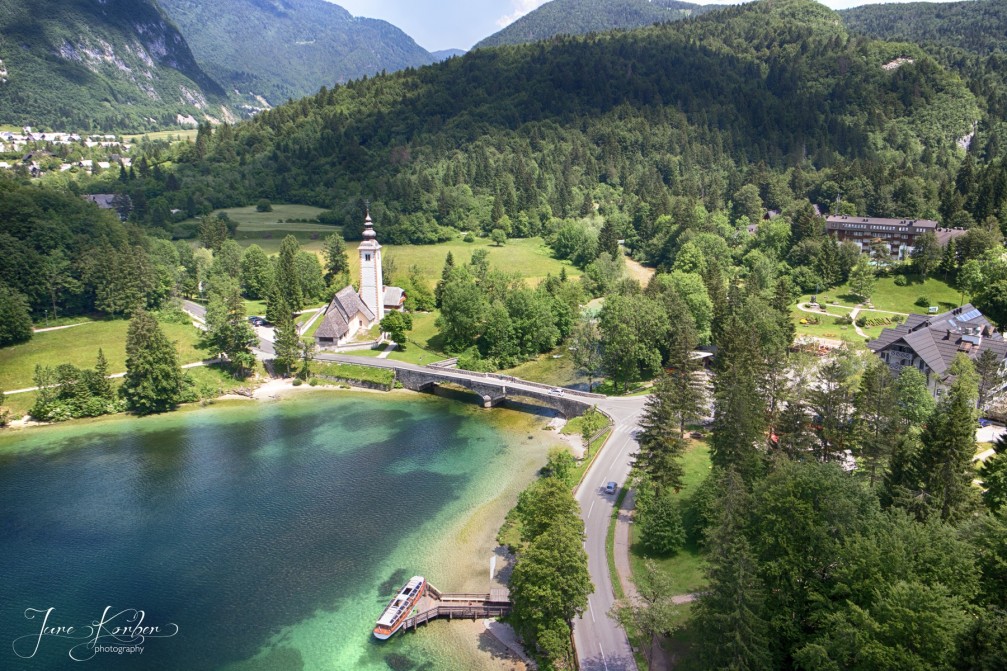
One of the best known landmarks in the Bohinj area is the Church of St. John the Baptist, sitting beside a lovely stone bridge. This quaint, unremarkable-looking church contains 14th, 15th and 16th century frescoes of superb quality.
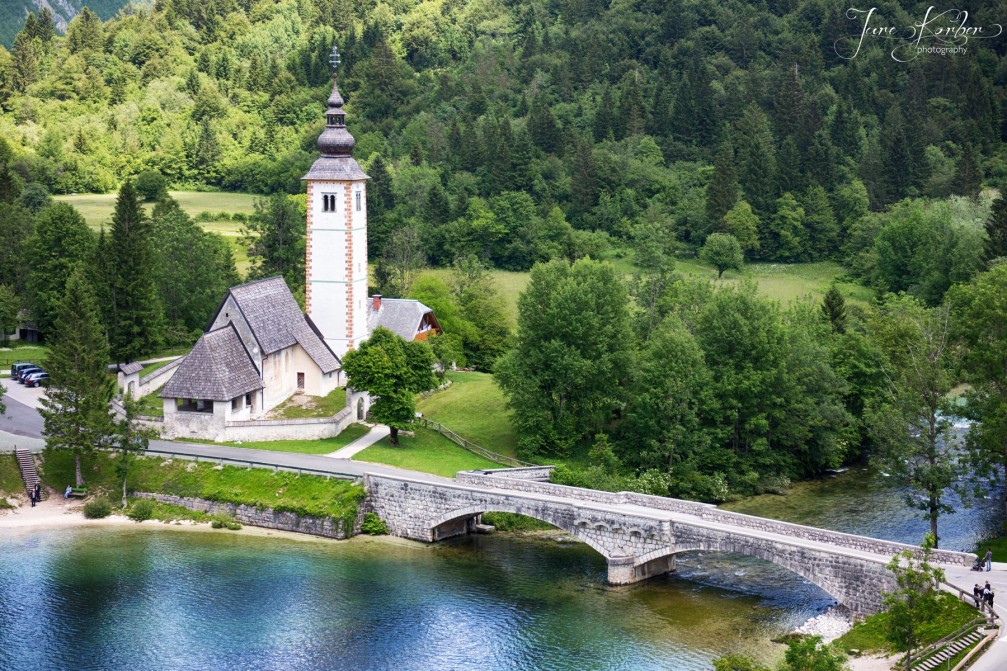
The Ribcev Laz end of the Lake Bohinj is dominated by the church of St John the Baptist and bridge across the river. The church is built in a west-east orientation and is surrounded by an old cemetery wall with two entrances. The nave is Romanesque, but the Gothic presbytery dates from the 15th century.
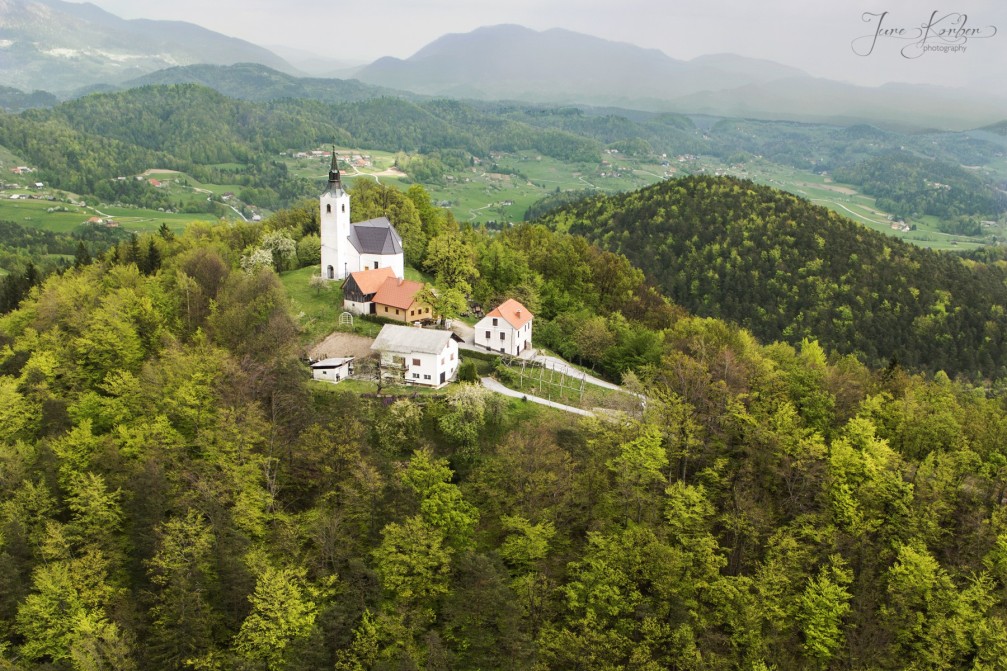
The small village of Sentjungert lies on the northwestern outskirts of the city of Celje in the Styria region of Slovenia. The village’s best known landmark is the Church of St. Cunigunde which was first mentioned in the historical record in the 14th century.
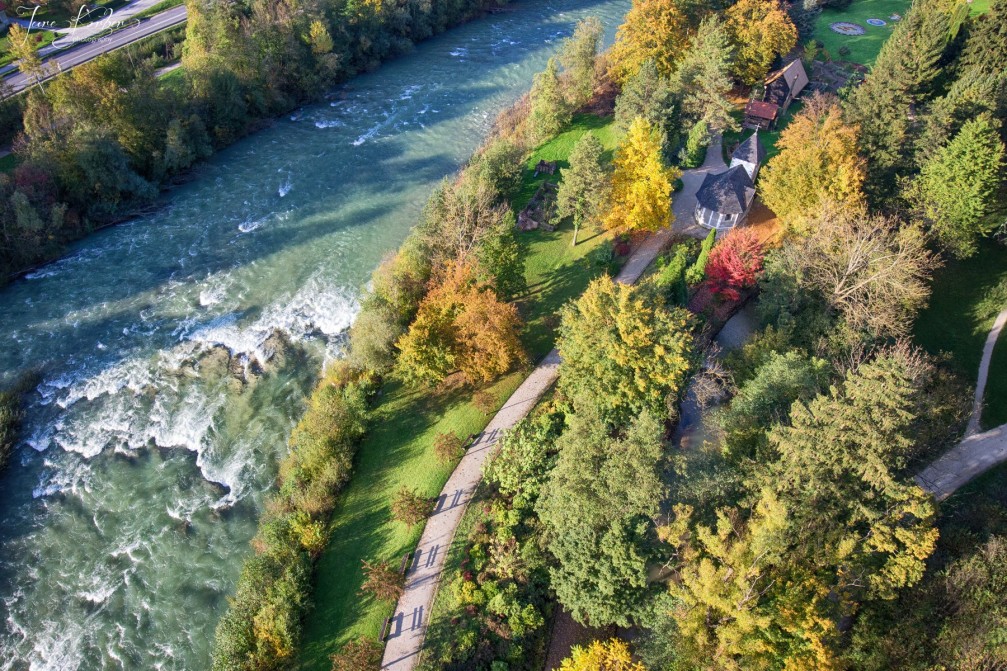
The Mozirski Gaj flower park lies on the right bank of the Savinja River near the small town of Mozirje. It’s a lovely place to spend a few hours with colourful displays of flowers that bloom every year from the end of April until September.
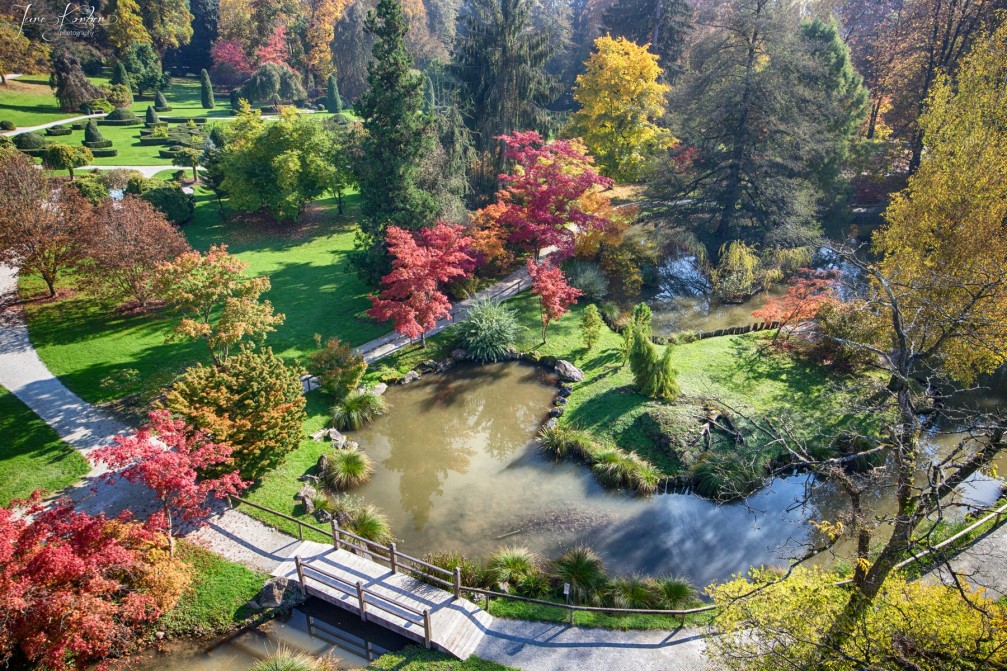
The Volcji Potok Arboretum is Slovenia’s most visited botanical garden which is worth visiting at any time of the year. Lying on an 80-hectare site, it supports more than 3,500 perennial flower, bush and tree species from all over the world.
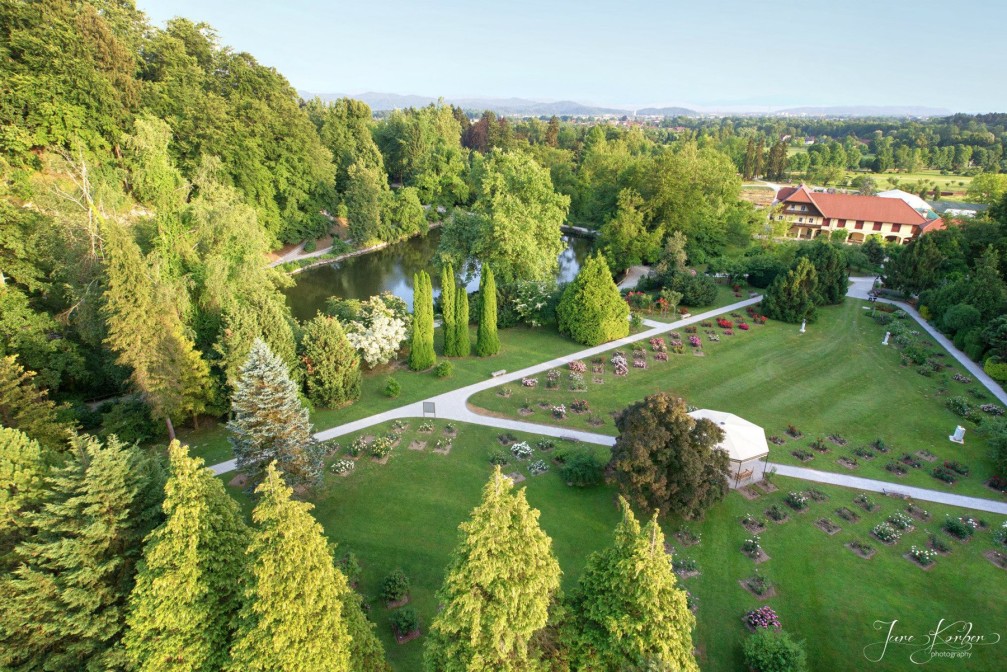
In recent years the Volcji Potok Arboretum has become very well known for its spring flower shows. And with all the good reason!
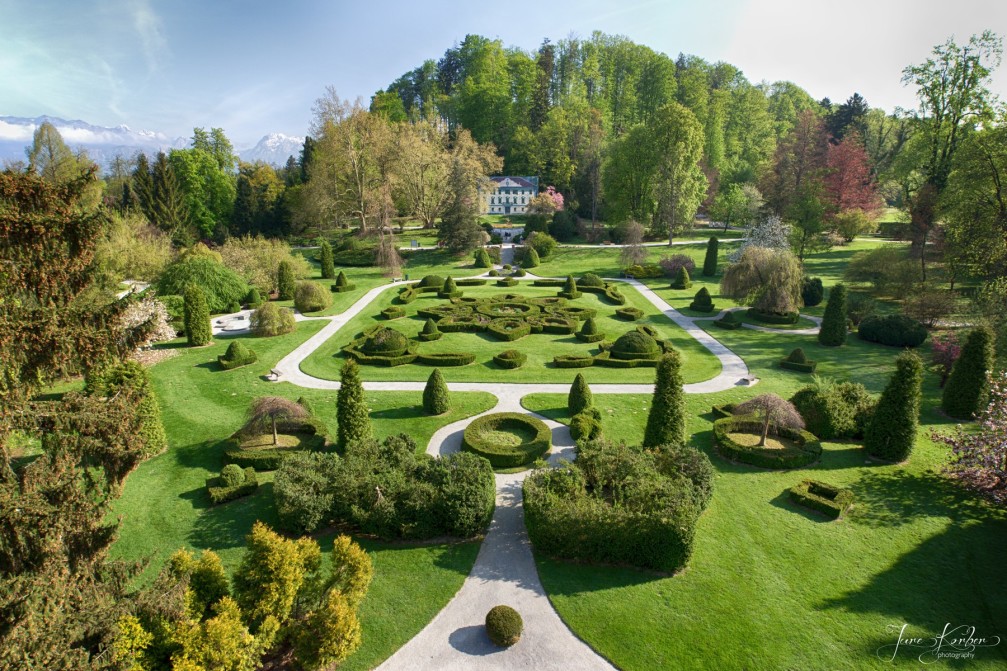
Arboretum Volcji Potok was opened to the public in 1952. It originally formed part of the Souvan family estate, but then the University of Ljubljana took over in 1952 and declared Volcji Potok a place of cultural and natural heritage of national importance. The French park (on the photo) is one of the most beautiful parts of Volcji Potok.
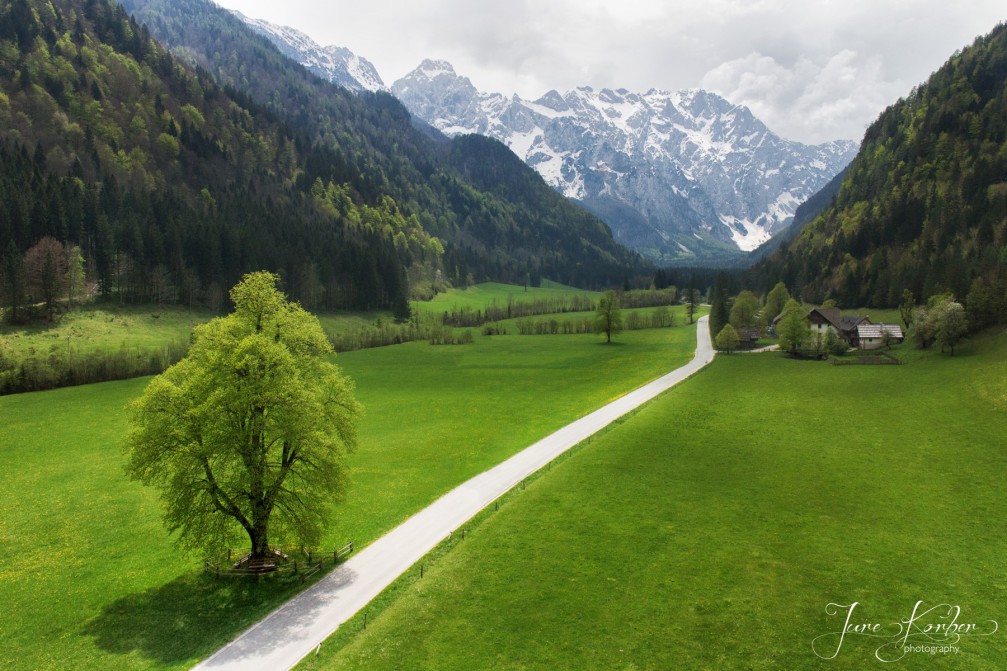
The Logar Valley (or Logarska Dolina in Slovenian) is a beautiful mountain valley, carpeted with green meadows and hemmed in by icy gray peaks. It will take you back into the past, thanks to scattered old farmsteads on green meadows, and lonely colorful beehives along the road. The valley is considered one of the most beautiful places to photograph in Slovenia.
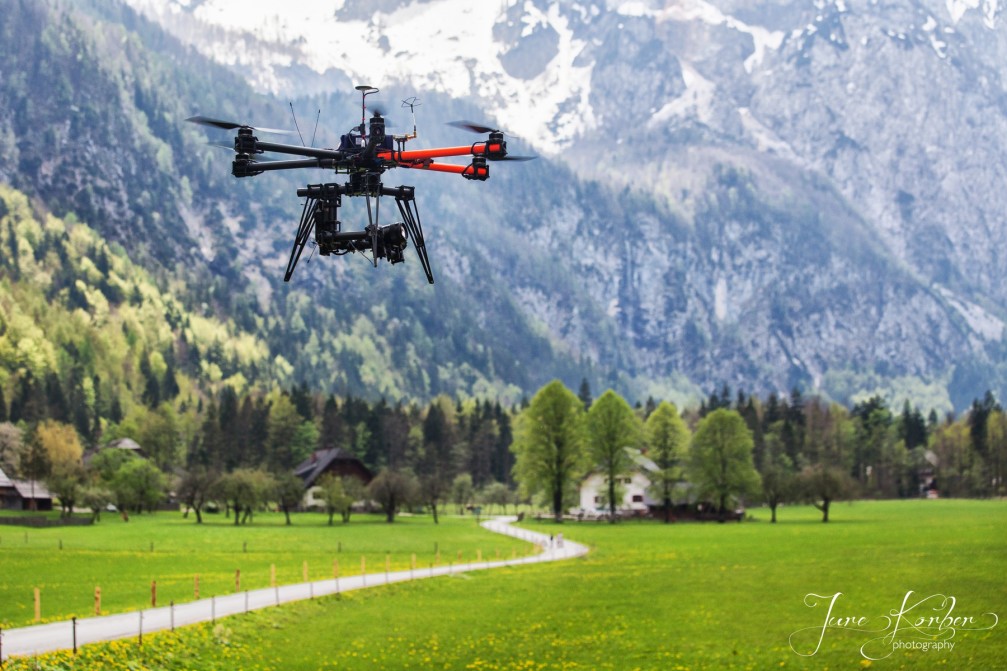
If you see a photograph taken from above — but seemingly from far too low to have been shot from a plane — chances are that you’re looking at an image shot from an aerial photography platform a.k.a. drone. Jure Korber and Tjasa Borsnak took their aerial photography platform called Hexabee into the sky and captured Slovenia from angles not seen before.
| |
|---|
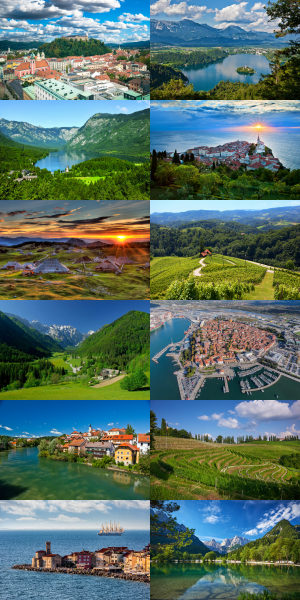  Discover beautiful Slovenia through amazing photos that will instantly make you want to visit and explore this delightful country in the heart of Europe. View more than 100 galleries with more than 5.500 landscape and nature photos from 50+ photographers! ENJOY! |
| |
|---|
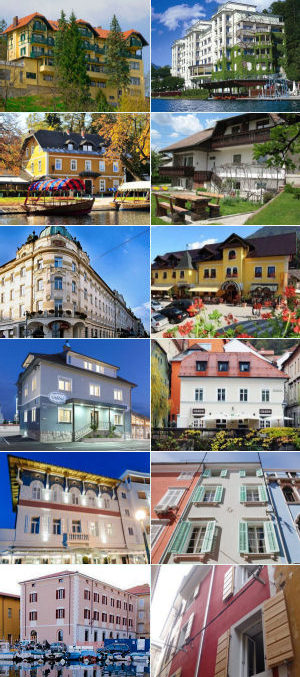  There is a wide array of options for accommodations in Slovenia, including hotels, guest houses, apartments, bed and breakfasts, hostels, camping and glamping sites and farm stays. Find out which places to stay in Slovenia we recommend and why! |


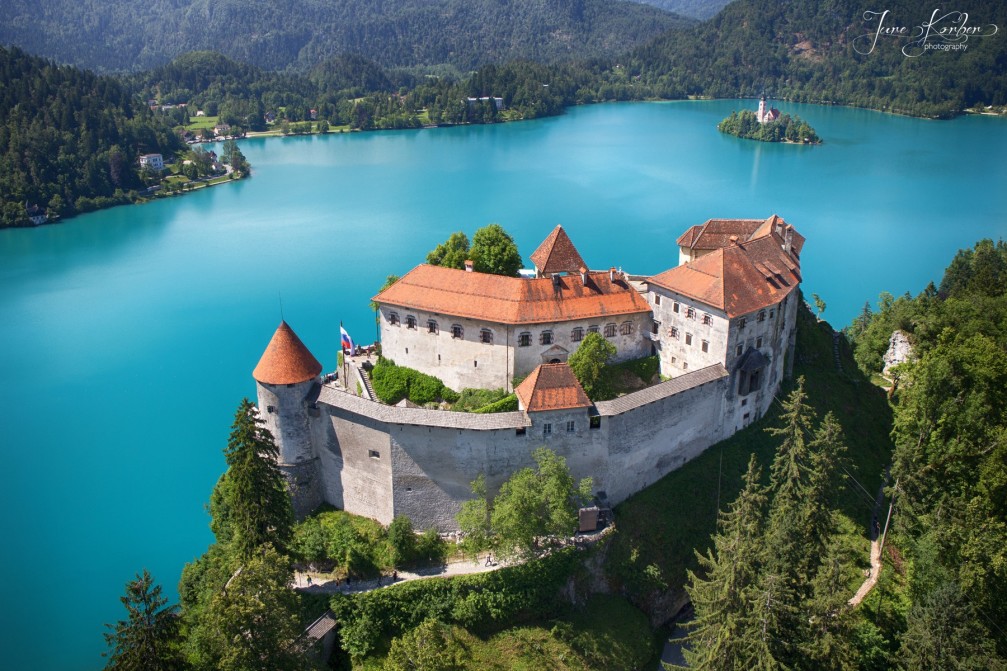
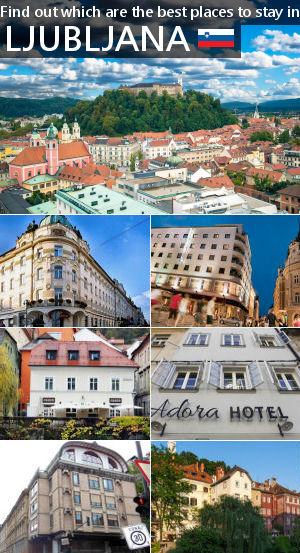
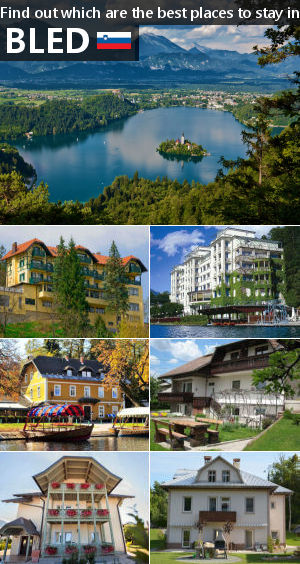
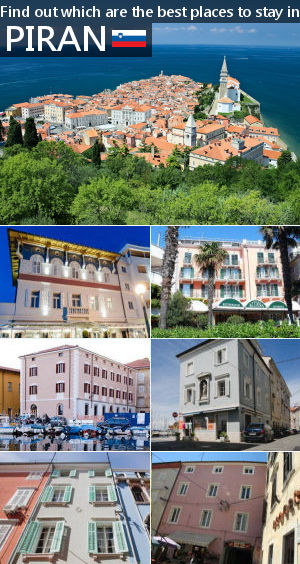

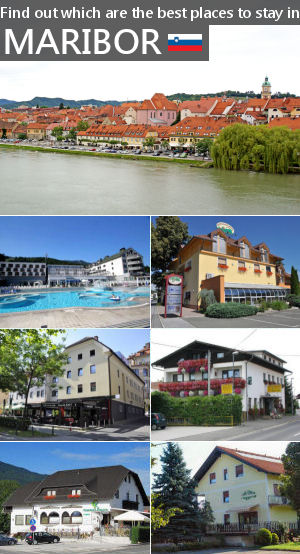
Najlepša Slovenija, moja domovina. Res bi si zaslužila vse naše spoštovanje in ljubezen.
Totally unexpected and so absolutely beautiful…
VELKÁ KRÁSA !!!!
Hope to get there next year
Wow! Just – wow!
Great photography, what a team, congrats. If you do get to Gottschee, please do Nemska-loka, Brezowitz, and Sponji loc Al Schutte’ NY
Hvala ti Jure. Pokazi se naprej Svetu nas ZAKLAD in kje smo Doma.
Lp iz Svice. DRAGO
Sophia Stalzer Wyant: CONGRATULATIONS on the most beautiful photos of Slovenia. Love the country. I am Gottscheer born in 1936 near Crmosnjice near Dol. Toplice and Novo Mesto. Left there in Dec. 1941 and am living in Minnesota USA. I am so impressed with your excellent photographjy. Any chance you might photograph the former German Linguistic Island of Gottschee now Kocevsko. Would be wonderful to see. Gottscheer greetings from Minnesota USA.
Cudovito!!!!!!
Abolutely fabulous, can´t wait to head up to Slovenia – one day!
Love that picture of Lake Bled! Great photos all around!
Beautiful! Bled looks like a place I want to be now!
Zelo lepo,ampak Belakrajine pa ni????
These photos are like a visual orgasm. SO AMAZING! They are just stunning.
Slovenia seems to be so beautiful! Definitely on my bucket list!
Gorgeous photos! I spent my 21st birthday in Slovenia this year with my sister. We loved it! It was super cold in February but loved it all the same.
Wow such wonderful photos. I’ve been to Slovenia twice and have loved it both times
I’ve never been to Slovenia but it is definitely a country I would love to visit one day. Beautiful pictures!
Jure vsakič z veseljem pogledam tvoje fotke…čestitke in kar tako naprej.
Charming photos. I’m visiting Slovenia in a few weeks and now I’m ultra-excited!
Spectacular! I still regret not hopping to Slovenia from Croatia. So close.
Izredno!!! Prav vse fotografije in vsaka posebej je čisti užitek
I think this is a lovely tribute to Slovenia, where I’ve never been but would be curious to, as I am getting to know more and more of Europe.
I’m drooling over these lovely photos! I haven’t been to Slovenia, but I would love to go there soon!
Lovely pictures. I have traveled to many beautiful places in my life and I agree, Slovenia is gorgeous and offers many marvelous photo ops.
I tried to chose the best place.. but no way! Each destination is more beautiful than another..
I love Slovenia. Now these photos provokes me really hard.. I just want to jump out of my bed and run to the airport to catch the first airplane to Slovenia
Breathtaking photographs, highly inspiring to hit Slovenia. For sure my favorite is Lake Bled.
Love all the photos. I’m from Spain and plan on visiting Slovenia this summer with some of my friends and I got the task of making a list with potential destinations and things to do. This article saved me, thanks a lot.
Stunning photos! I’ve seen some of these places and I’ve completely fallen in love with them, especially Bled and Ljubljana!